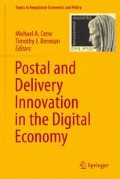Abstract
The increasing use of digital channels for communication, both domestic and commercial, has led National Postal Operators (NPOs) to explore other revenue streams. The increase in use of all things digital has been described as ‘among the most consequential thing to happen to humanity’ (Bostron 2007). There is evidence that it is indeed impacting society in terms of communication, healthcare, governance and education levels.
Access this chapter
Tax calculation will be finalised at checkout
Purchases are for personal use only
Notes
- 1.
These predictions were made by a panel of communications experts not directly associated with NPOs.
References
Accenture. (2009). How global organisations approach the challenge of protecting personal data, s.l.: Accenture.
Allen, A. L. (1998). Coercing privacy. William & Mary Law Review, 40, 723.
Bostron, N. (2007). Technological revolutions: Ethics and policy in the dark. In N. M. de S. Cameron & M. E. Mitchell (Eds.), Nanoscale: Issues and perspectives for the nano century (pp. 129–152). Hoboken: Wiley.
Cavoukian, A. (2010). Privacy by design: Origins, meaning, and prospects for assuring privacy and trust in the information era. In G. O. Yee (Ed.), Privacy protection measures and technologies in business organizations: Aspects and standards (pp. 170–208). Chicago: IGI Global.
Cavoukian, A. (2014). Privacy by design. Report of the Information & Privacy Commissioner Ontario, Canada.
Chun, S. A., Shulman, S., Sandoval, R., & Hovy, E. (2010). Government 2.0: Making connections between citizens, data and government. Information Polity, 15(1–2), 1–9.
Copenhagen Institute for Future Studies. (2011). Role of mail 2020. s.l.: International Post Corporation.
Culnan, M. J., & Armstrong, P. K. (1999). Information privacy concerns, procedural fairness, and impersonal trust: An empirical investigation. Organization Science, 10(1), 104–115.
Electronic Privacy Information Centre. (2010). EU data protection directive. [Online]. http://epic.org/privacy/intl/eu_data_protection_directive.html. Accessed 28 Jan 2011.
Featherman, M. S., & Pavlou, P. A. (2003). Predicting e-services adoption: A perceived risk facets perspective. International Journal of Human-Computer Studies, 59(4), 451–474.
Federal Trade Commission. (2012). Protecting consumer privacy in an era of rapid change: A proposed framework for businesses and policymakers. [Online]. http://online.wsj.com/public/resources/documents/PrivacyReport_FINAL.pdf. Accessed 11 Nov 2012.
Gellman, R. (2012). Fair information practices: A basic history. [Online]. http://bobgellman.com/rg-docs/rg-FIPShistory.pdf. Accessed 6 Nov 2012.
Hearn, J. (2014). Delivering the goods to households: Would further regulation help or hinder? In The role of the postal and delivery sector in a digital age (p. 146). Cheltenham: Elgar.
Introna, L. D. (1997). Privacy and the computer: Why we need privacy in the information society. Metaphilosophy, 28(3), 259–275.
Introna, L. D. (2000). Workplace surveillance, privacy and distributive justice. ACM SIGCAS Computers and Society, 30(4), 33–39.
Kelly, G., Mulgan, G., & Muers, S. (2002). Creating public value. An analytical framework for public service reform. [Online]. Strategy Unit discussion paper accessed at: http://webarchive.nationalarchives.gov.uk/+/http://www.cabinetoffice.gov.uk/strategy/downloads/files/public_value2.pdf. Accessed Oct 2011.
Kim, K., & Prabhakar, B. (2000). Initial trust, perceived risk, and the adoption of internet banking. Proceedings of the international conference on information systems (Vol. 21, pp. 537–543). Brisbane: Association for Information Systems Atlanta.
Malhotra, N. K., Kim, S. S., & Agarwal, J. (2004). Internet users’ information privacy concerns (IUIPC): The construct, the scale, and a causal model. Information Systems Research, 15(4), 336–355.
Microsoft.com. (2014). Get delivery and read receipt confirmations. Microsoft Office Support. http://office.microsoft.com/en-ie/outlook-help/get-delivery-and-read-receipt-confirmations-HP010080428.aspx
Moloney, M., & Church, L. (2012). Informational privacy preservation through universal service obligations. Journal of Internet Technology and Secured Systems, 1(1/2), 11–14.
Moore, A. D. (2007). Toward informational privacy rights. San Diego Law Review, 44(4), 809–845.
Ofcom. (2013). Review: Mail integrity and postal common operational procedures. Review report from Ofcom. http://stakeholders.ofcom.org.uk/binaries/consultations/mail-integrity/summary/condoc.pdf
Office of Inspector General for USPS. (2013). Primer on postal challenges. Washington, DC: U.S. Postal Service Office of Inspector General.
Oppliger, R. (2004). Certified mail: The next challenge for secure messaging. Communications of the ACM, 47(8), 75–79.
Oppliger, R. (2007). Providing certified mail services on the internet. Security and Privacy, 5(1), 16–22.
Oppliger, R., & Stadlin, P. (2004). Fair exchange. Computer Communications, 27(13), 1229–1235.
Shankar, V., Urban, G. L., & Sultan, F. (2002). Online trust: A stakeholder perspective, concepts, implications and future directions. Journal of Strategic Information Systems, 11, 325–344.
Smith, H. J., Dinev, T., & Xu, H. (2011). Information privacy research: An interdisciplinary review. MIS Quarterly, 35(4), 989–1015.
Stewart, K. A., & Segars, A. H. (2002). An empirical examination of the concern for information privacy instrument. Information Systems Research, 13(1), 36–49.
Tauber, A. (2010). Requirements and properties of qualified electronic delivery systems in eGovernment: An Austrian experience. International Journal of E-Adoption, 2, 45–58.
Tauber, A. (2011). A survey of certified mail systems provided on the internet. Computers and Security, 30(6–7), 464–485.
Tauber, A. A. J., & Boldrin, L. (2012). An interoperability standard for certified mail systems. Computer Standards and Interfaces, 34(5), 452–466.
The Irish Data Protection Commissioner. (2012). EU Directive 95/46/EC – The data protection directive, Chapter I – General provisions. [Online]. http://dataprotection.ie/viewdoc.asp?DocID=92. Accessed 6 June 2012.
The Ponemon Institute. (2010). 2010 privacy trust study of the United States Government. Traverse City: The Ponemon Institute.
UN News Centre. (2013). Posts consider postal e-services strategically important for future, 23.01.2012. Retrieved 31 October, from news.upu.int/no_cache/nd/posts-consider-postal-e-services-strategically-important-for-future/
Whitley, E. A. (2009). Informational privacy, consent and the “control” of personal data. Information Security Technical Report, 14(3), 154–159.
Author information
Authors and Affiliations
Corresponding author
Editor information
Editors and Affiliations
Rights and permissions
Copyright information
© 2015 Springer International Publishing Switzerland
About this chapter
Cite this chapter
Sheedy, C., Moloney, M. (2015). Informational Privacy and Registered Certified Mail: What Do the People Want?. In: Crew, M., Brennan, T. (eds) Postal and Delivery Innovation in the Digital Economy. Topics in Regulatory Economics and Policy, vol 50. Springer, Cham. https://doi.org/10.1007/978-3-319-12874-0_15
Download citation
DOI: https://doi.org/10.1007/978-3-319-12874-0_15
Published:
Publisher Name: Springer, Cham
Print ISBN: 978-3-319-12873-3
Online ISBN: 978-3-319-12874-0
eBook Packages: Business and EconomicsEconomics and Finance (R0)

